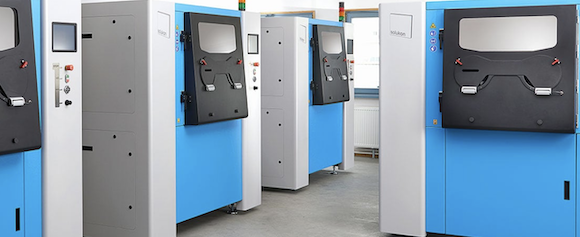Solukon and Festo partner to boost automated depowdering efficiency
June 15, 2021

Solukon Maschinenbau GmbH, Augsburg, Germany, has teamed up with industrial automation solutions supplier Festo, Esslingen, Germany, to identify by how much the level of automation in the depowdering stage of Additive Manufacturing can be increased. The further automation of this, and other AM processes, could offer even more growth potential than the 24% annual growth rate anticipated by industry experts, it was stated.
“We are delighted to be partnering with Festo, and to have its innovative strength and expertise in automation technology on board for this project,” stated Andreas Hartmann, CEO and Technical Director of Solukon Maschinenbau GmbH.
Based on the proprietary Smart Powder Recuperation (SPR®) technology, Solukon’s powder removal systems remove the powder residues from complex additively manufactured metal components through an automated process of swivelling and vibration excitation, which can be standardised and is reproducible. With the advanced frequency system, the flow of the powder can be continually controlled so that narrow openings and channels can be depowdered – including components with complex voids and channels, such as heat exchangers.
Any automated depowdering process, however, can sometimes struggle to remove powder from component surfaces, particularly when dealing with difficult-to-handle materials like copper. In order to dislodge fine deposits, a light and direct airflow is utilised. This method of blowing air can also be used through the channels in order to ensure that they are also free of residue. Currently, this dislodging process is a manual procedure that Solukon carries out using glove ports.
It was stated that the increasing size and complexity of AM components can prove an issue when depowdering, with the access of parts over 1 m in height requiring supports. Solukon, with a customer base in the increasingly AM-reliant aerospace industry, aims to address this trend with its depowdering systems. The partners hope to optimise existing automated processes for depowdering and enable a fully-automated, integrated process chain.
The team will look at adding an automated handling setup to Solukon’s depowdering system to automatically move the blowing or machining tool. The challenges for this automation solution lie in the flexible adaptation of the motion profile to changing component contours and in the ambient conditions, where the key issues are dust protection, ATEX and protected atmosphere.
Festo and Solukon are currently working on a concept to simulate the automation platform that provides the necessary flexible machining possibilities, including a feasibility analysis of how accessible the working space is. Artificial intelligence could support contour detection using the CAD data of the component to be machined, for example.
The companies hope that the end result, fully-automated and residue-free depowdering, should lead to accelerated, precise and reproducible processes and ensure that manual rework is no longer necessary. This outcome would significantly cut the manufacturing costs for different batch sizes.
Felix Hantsch, Project Manager in Innovation and Robotics Cluster DACH at Festo, commented, “Up to now, we have not taken advantage of the potential of automation in many process steps. We, therefore, see these innovative automation approaches as great opportunities for the future topic of Additive Manufacturing.”
















